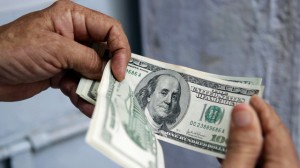This post first appeared at ThinkProgress.
The top 10 percent of earners in the United States took home more than 50 percent of all income in 2012, the highest amount ever recorded since data was first collected in 1917, according to an updated report from economists Emmanuel Saez and Thomas Piketty.
While the wealthiest took a big hit during the financial crisis, they’ve almost fully recovered. Last year, income for the top 1 percent of earners “increased sharply,” the report notes, growing by nearly 20 percent, while the bottom 99 percent only saw money rise by 1 percent. “In sum,” the authors write, “top 1 percent incomes are close to full recovery while bottom 99 percent incomes have hardly started to recover.”
This follows a trend since the recovery officially began. From 2009 to 2012, income for the 1 percent grew by 31.4 percent, while everyone else only saw it grow by 0.4 percent. That means the 1 percent “captured 95 percent of the income gains in the first three years of the recovery,” they write.
The authors point out that rather than the Great Recession helping to mitigate income inequality, which has skyrocketed since the 1970s, it only temporarily disrupted a trend that is now continuing. And policy isn’t helping. Given that recessions only have a temporary impact on top earners “unless drastic regulation and tax policy changes are implemented and prevent income concentration from bouncing back,” the United States would have to aggressively implement changes that could reverse the trend. That’s what happened after the Great Depression, when the New Deal was enacted. But the response to the Great Recession, which mostly amounted to the Dodd-Frank financial reform bill and an increase in the top tax rate, “are modest relative to the policy changes that took place coming out of the Great Depression,” they write. It’s unlikely they will make any lasting change.
The U.S. suffers from particularly drastic income inequality. It is worse here than in Egypt, Tunisia, Yemen, the Ivory Coast, Pakistan, and Ethiopia. It’s a trend that began in the 1970s and has continued: Through the 2000s, the richest 20 percent of Americans saw their incomes grow by $2,550, while the bottom 20 percent just saw $1,330 in growth. The top 10 percent now has 15.9 times the income of the bottom.
And U.S. policy is mostly to blame. The deregulation of Wall Street meant huge profits in the sector, attracting the 1 percent, whose incomes then took off from everyone else’s. Changes in the tax code for capital gains income, or money made through investment rather than salaries, is one of the largest factors. While the social safety net has helped keep the gap smaller than it otherwise would be, the U.S. has been cutting back drastically on social spending. We’re set to cut $1.5 trillion in spending over the next decade.
 Bryce Covert is the economic policy editor for ThinkProgress. She was previously editor of the Roosevelt Institute’s Next New Deal blog and a senior communications officer. She is also a contributor for The Nation and was previously a contributor for ForbesWoman. Her writing has appeared on The New York Times, The New York Daily News, The Nation, The Atlantic, The American Prospect, and others. Follow her on Twitter at @brycecovert. Bryce Covert is the economic policy editor for ThinkProgress. She was previously editor of the Roosevelt Institute’s Next New Deal blog and a senior communications officer. She is also a contributor for The Nation and was previously a contributor for ForbesWoman. Her writing has appeared on The New York Times, The New York Daily News, The Nation, The Atlantic, The American Prospect, and others. Follow her on Twitter at @brycecovert. |


